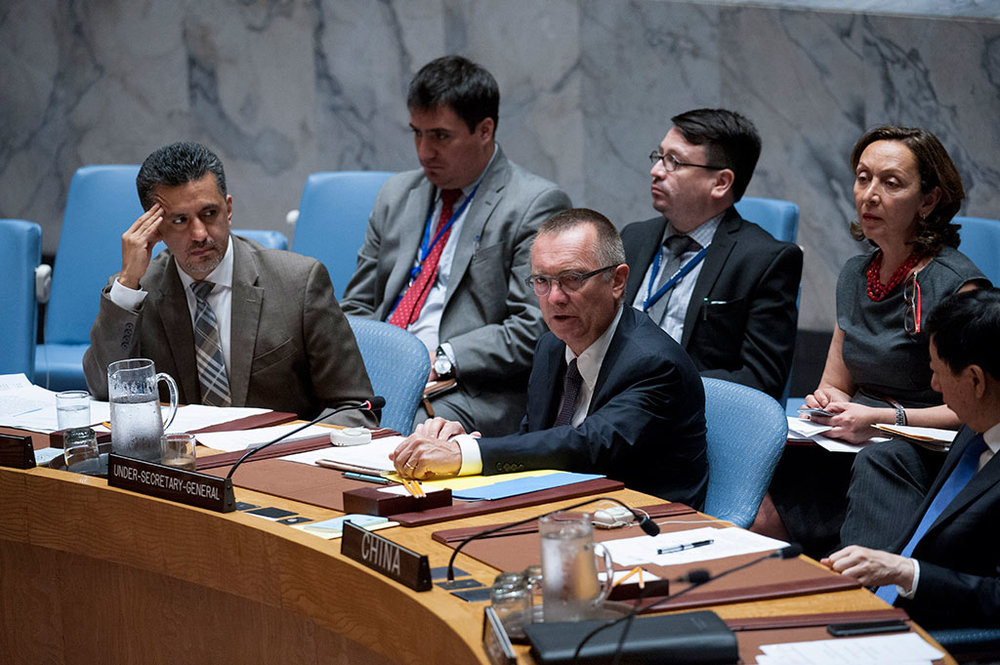UN Security Council renews support for nuclear deal

TEHRAN – The United Nations Security Council on Thursday renewed support for Iran’s nuclear deal with world powers, underscoring that Tehran has shown full commitment to the accord and the resolution supporting it.
Briefing the Security Council, Jeffery Feltman, the Under-Secretary-General for Political Affairs, said: “The Secretary-General believes that the comprehensive and sustained implementation of the Joint Comprehensive Plan of Action (JCPOA) will guarantee that Iran’s nuclear program remains exclusively peaceful, while allowing for transparency, monitoring and verification.”
Iranian Foreign Minister Mohammad Javad Zarif welcomed the UN support, tweeting: “The UN & entire world say Iran is in full compliance with its commitments, but US visceral hatred of Iran compels it to deny the obvious.”
The top Iranian diplomat also hailed Europe for their unfailing honoring of the nuclear accord, saying: “Excellent meetings with leaders in Berlin, Rome & Paris. Despite US reckless hostility, EU committed to #JCPOA 7 constructive engagement.”
Zarif touched down in Tehran on Friday after a five-day trip to three European countries of Germany, Italy and France.
The nuclear deal was forged in July 2015 between Iran and six world powers of the U.S., China, Russia, England, France and Germany after nearly two years of high-level negotiations.
The accord, which took force on January 16, 2016, removed all nuclear-related sanctions imposed on Iran in reward for it scaling back its nuclear activities.
Iran says its nuclear program has been peaceful from the outset, and rejects ever having thought of developing atomic weapons.
“It will also provide Iran with an opportunity for greater engagement with the international community and assist in increasing its trade and economic relations [as well as] bring forth to a satisfactory conclusion the consideration of the Iranian nuclear issue by the Council,” Feltman added.
Feltman told the 15-member body that the Secretary-General had not received any report, nor is he aware of any open source information regarding the supply, sale or transfer to Iran of nuclear-related items undertaken contrary to the provisions of the resolution.
“The Secretary-General is hopeful that all participants will continue to make progress in the implementation of the agreement, and in the process secure its durability,” he said.
Tehran has complained that it is not getting economic benefits it was promised in the nuclear deal, arguing that the U.S. has not acted in consistent with the constructive spirit of the accord.
Iran cites paragraphs 26-29 of the JCPOA, official name for the accord, which urge the Western side, including the U.S., to act in “good faith” in implementing the agreement.
Paragraph 26 says: “The United States will make best efforts in good faith to sustain this JCPOA and to prevent interference with the realization of the full benefit by Iran of the sanctions lifting…”
Despite the call and ongoing backing from the other signatories, Washington is critical of the accord.
Criticism launched at the deal by the Trump administration is unsubstantiated as since January 2016, the IAEA has verified on six separate occasions that Iran is fulfilling its JCPOA obligations.
In a statement released by the U.S. State Department in April, Secretary of State Rex Tillerson said Iran was making good on its commitment under the agreement, but added that President Donald Trump has ordered a review of the deal.
The review is due July 18, when President Trump is to extend six-month sanctions waivers.
The State Department has to brief Congress on Iran's progress in the nuclear deal on a routine, quarterly basis.
Back in February, the U.S. imposed sanctions on 25 Iranian individuals and entities in response to missile launches by Iran.
On June 15, the Senate voted nearly unanimously for legislation to impose new sanctions on Iran, and Russia, including new sanctions on Iran over its ballistic missile program among others.
Washington has increasingly been sensitive to Iran’s missile tests, seeing them “in defiance of” UN resolution 2231, which backs the nuclear accord.
The resolution "calls upon Iran not to undertake any activity related to ballistic missiles designed to be capable of delivering nuclear weapons, including launches using such ballistic missile technology."
There is no consensus in the Security Council on if Iran’s missile tests are in breach of the resolution.
“As in the case of the ballistic missile launches by Iran in March 2016, there was no consensus in the Security Council on how this particular launch related to resolution 2231 (2015),” said Mr. Feltman of Tehran’s missile launches in March 2016.
Quoting from the third report of the Secretary-General on the resolution, he added that the Secretary-General called on Iran to avoid such ballistic missile launches “that have the potential to increase tensions.”
Shortly after the March missile ballyhoo, Zarif said its ballistic missiles were for self-defense and “do not even fall within the purview of 2231”.
"Iran will never use any means to attack any country, including our missiles. These are only for our defense. I challenge those who are complaining about Iran's missile program ... to make the same statement," he told reporters in Australia.
PA/PA
Leave a Comment